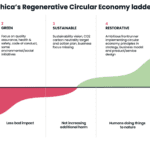
In recent years, sustainability has become a core priority for businesses worldwide. As consumers become more environmentally conscious and governments enforce stricter environmental regulations, companies are increasingly turning to sustainable practices. One of the key areas where this transformation is taking place is in the supply chain. A sustainable supply chain focuses on minimizing environmental impact and promoting social responsibility, while still maintaining operational efficiency and profitability. Here’s a closer look at what sustainable supply chains involve and why they are critical for businesses today.
What is a Sustainable Supply Chain?
A sustainable supply chain incorporates environmental, social, and economic considerations into the entire lifecycle of a product, from raw material sourcing to manufacturing, transportation, and disposal. Unlike traditional supply chains, which often prioritize cost efficiency and speed, sustainable supply chains aim to minimize their ecological footprint while supporting ethical labor practices and ensuring long-term profitability.
A sustainable supply chain ensures that:
- Raw materials are sourced responsibly, minimizing environmental degradation.
- Manufacturing processes are energy-efficient and reduce waste.
- Transportation is optimized for lower carbon emissions.
- Waste management focuses on recycling, reusing materials, and reducing landfill use.
- Working conditions across the chain are ethical, ensuring fair wages and safe environments for workers.
Key Components of a Sustainable Supply Chain
- Environmental Sustainability: Reducing emissions, waste, and resource consumption is critical. This often includes using renewable energy, sourcing eco-friendly materials, and optimizing transportation to reduce carbon footprints. For example, companies may shift to electric vehicles for transportation or redesign packaging to reduce waste.
- Social Responsibility: Ensuring fair labor practices and supporting the communities where suppliers operate is vital. This can include providing safe working conditions, fair wages, and benefits to workers. Additionally, companies often engage in projects that support local communities, such as investing in education or healthcare.
- Economic Viability: While sustainability may initially require investment, in the long term, it often leads to cost savings through energy efficiency, waste reduction, and improved brand loyalty. It also helps companies comply with regulations and avoid fines, ensuring long-term profitability.
Benefits of a Sustainable Supply Chain
- Cost Efficiency: While some sustainable practices, such as renewable energy adoption or ethical sourcing, might require initial investment, they often lead to long-term cost savings. Efficient energy usage, optimized logistics, and waste reduction can cut operational costs.
- Improved Brand Image: Companies with sustainable supply chains tend to enjoy better reputations. As consumers become more aware of environmental issues, they prefer brands that align with their values. A commitment to sustainability can lead to increased customer loyalty and market share.
- Regulatory Compliance: Governments and international bodies are increasingly introducing stringent environmental and labor regulations. A sustainable supply chain helps businesses comply with these regulations, avoiding legal penalties and gaining access to markets with stricter environmental laws.
- Risk Mitigation: Traditional supply chains can be disrupted by resource shortages, environmental disasters, or unethical labor practices. Sustainable supply chains are designed to be more resilient to these risks by diversifying suppliers, reducing resource dependency, and adhering to ethical standards.
- Innovation and Growth: Pursuing sustainability can drive innovation. Companies often find new ways to reduce waste, improve processes, or create new eco-friendly products. This innovation can lead to new market opportunities and competitive advantages.
Challenges in Implementing a Sustainable Supply Chain
- Initial Costs: Shifting to a sustainable supply chain often requires significant initial investment, such as adopting renewable energy or upgrading to energy-efficient machinery. While these investments often pay off over time, the upfront costs can be a barrier for smaller companies.
- Complexity in Monitoring: It can be challenging to monitor and ensure sustainability across the entire supply chain, particularly for global companies that work with numerous suppliers. Ensuring transparency and adherence to environmental and social standards across different regions is crucial but difficult to maintain.
- Supplier Collaboration: Not all suppliers are on board with sustainability initiatives. Engaging and encouraging suppliers to adopt greener practices requires collaboration, training, and sometimes financial incentives.
- Consumer Demand for Low Prices: While many consumers express interest in sustainability, they are often unwilling to pay a premium for environmentally friendly products. Balancing the demand for sustainable practices with competitive pricing is a challenge for many businesses.
Future of Sustainable Supply Chains
The shift towards sustainability in supply chains is only expected to accelerate. As technology advances, companies will have access to more efficient solutions, such as AI for logistics optimization, blockchain for supply chain transparency, and sustainable materials developed through research and innovation. Furthermore, as more consumers prioritize sustainability, businesses that fail to adapt may lose their competitive edge.
Governments and international organizations will also continue to play a critical role, as they set new standards for environmental protection and labor rights. Companies will need to remain flexible and proactive in their approach to sustainability, ensuring they stay ahead of both regulatory changes and consumer expectations.
Conclusion
Sustainable supply chains are no longer a niche concern but a necessity in today’s business environment. They not only protect the environment and improve social outcomes but also drive long-term profitability and resilience. By investing in sustainability, companies can reduce risks, enhance their brand reputation, and create a positive impact on the world.

